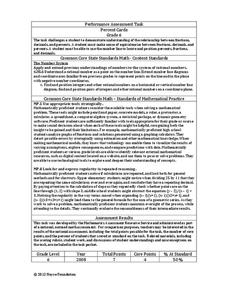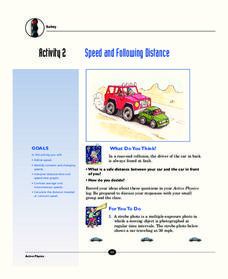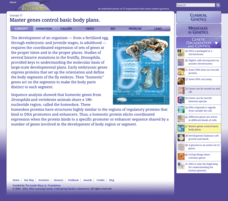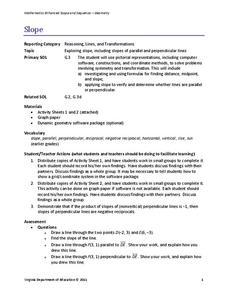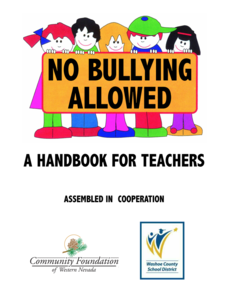Virginia Department of Education
Congruent Triangles
Is this enough to show the two triangles are congruent? Small groups work through different combinations of constructing triangles from congruent parts to determine which combinations create only congruent triangles. Participants use the...
Noyce Foundation
Percent Cards
Explore different representations of numbers. Scholars convert between fractions, decimals, and percents, and then use these conversions to plot the values on a horizontal number line.
Curated OER
"Music Be the Food of Love:" Found Poetry with Shakespeare and Hip-Hop
Lines from Shakespeare and from hip-hop artists provide learners with an opportunity to examine the literary devices these artists use to express their ideas about love. Groups use the provided lines to craft found poems, and then the...
It's About Time
Speed and Following Distance
How much distance should you keep between your car and the one in front of you? Did you think of an answer in terms of time when the question clearly stated distance? The lesson covers the relationship between distance, time, and speed....
Illustrative Mathematics
Walk-a-thon 2
During a walk-a-thon your learners must determine the walking rate of Julianna's progress. Using tables, graphs, and an equation, they must be able to calculate the time it took her to walk one mile and predict her distance based on the...
Illustrative Mathematics
Similar Circles
Young geometers flex their transformation muscles in this brief but powerful exercise using dilations and translations to develop the similarity of circles. The plan provides guidelines to help learners navigate a pair of deceptively...
Inside Mathematics
Graphs (2006)
When told to describe a line, do your pupils list its color, length, and which side is high or low? Use a worksheet that engages scholars to properly label line graphs. It then requests two applied reasoning answers.
Radford University
Parallel Lines, Transversals, and Angles: What’s the Connection?
Streets, bridges, and intersections, oh my! Parallel lines and transversals are a present in the world around us. Learners begin by discovering the relationship of the angles formed by parallel lines and a transversal. They then apply...
Cold Spring Harbor Laboratory
Master Genes Control Basic Body Plans
Have you ever been so tired you missed a major announcement? Eric Wieschaus woke to a call explaining he won the Nobel Prize, but he thought it was just a dream until Christiane Nusslein-Volhard, a co-winner, explained it to him later...
02 x 02 Worksheets
Slope
What does slope have to do with lines? Pupils work with lines and determine the slope of the lines informally and with the slope formula. Groups use their knowledge to calculate the slopes of parallel and perpendicular lines. They also...
It's About Time
Diversity in Living Things
How diverse is the world we live in compared to the way things used to be? Young biologists explore diverse organisms and relate the structure of each organism to its ability to survive in our current environmental conditions....
Herff Jones Education
Chemical Energy
Provide the class with a quick lesson on chemical energy as they are assisted in creating hot and cold packs to demonstrate energy transfer between objects. They observe the energy change in matter as it transforms and distinguish...
It's About Time
Color Reactions that Involve the Transfer of Electrons
Demonstrate the aging of materials as you assist the class in creating rust. Individuals demonstrate oxidation-reduction reactions that result in the rusting of materials, differentiate between materials that will and will not rust, and...
Scholastic
Ruby Bridges: A Simple Act of Courage, Grades K-2
A civil rights movement lesson plan designed specifically with the Common Core State Standards in mind, young learners are introduced to the story of Ruby Bridges as the first African American child to attend an all-white elementary...
It's About Time
Effect of Lenses on Light
Optometry jokes just get cornea and cornea. Young scientists use a lens and light to create and measure focal points on both a note card and the wall. They then complete a reading passage and questions as homework.
It's About Time
How Electrons Determine Chemical Behaviors
Lead the class on an investigation as they play detective and locate patterns in the electron arrangement of atoms. During the seventh lesson, they assign valence numbers to elements, organize the periodic table in the correct sequence,...
It's About Time
Is It Heredity or the Environment?
Himalayan rabbits are black when raised at low temperatures and white when raised at high temperatures. Young biologists participate in an experiment using seeds to demonstrate the ways the environment can influence an inherited...
Herff Jones Education
Chemical Equations
Allow the class to play the role of "mind reader" as they predict the products of single and double displacement reactions. They also categorize reactions according to each type and balance chemical equations using the conservation of...
Ohio Literacy Resource Center
Solving Systems of Linear Equations Graphing
Do you need to graph lines to see the point? A thorough lesson plan provides comprehensive instruction focused on solving systems of equations by graphing. Resources include guided practice worksheet, skill practice worksheet, and an...
It's About Time
Plate Boundaries and Plate Interactions
How does the Earth continually repair itself? Explore the answer to this question, and others, with a unit on plate boundaries and interaction. Pupils classify the types of movement at plate boundaries and identify the distribution of...
It's About Time
The Rear End Collision
Did you know one in every four car crashes are rear end collisions? The lesson explains what happens to your neck when you are involved in a rear end collision. Scholars experiment and apply Newton's Second Law of Motion.
It's About Time
Cushioning Collisions (Computer Analysis)
Did you know the car bumper is specifically designed to save the car and not the passengers in case of an accident? Young scientists use a computer, a force probe, and a sonic ranger to experiment with external cushioning on cars.
Virginia Department of Education
Similar Triangles
Pupils work in pairs to investigate what it takes to prove that two triangles are similar. They work through various shortcuts to find which are enough to show a similarity relationship between the triangles. Small groups work with the...
Community Foundation of Western Nevada
No Bullying Allowed
Through discussion, role play, read-alouds, writing, and more, scholars explore the concept of bullying and practice having courage while responsibly reporting unfriendly behavior. Friendship and respect are practiced and encouraged. ...



